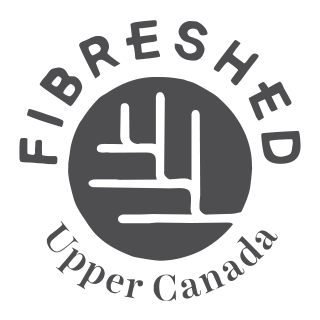Photographed by Emily Neill; Written and Researched by Becky Porlier
Just North of Rice Lake and the Oak Ridges Moraine, is Norwood Ontario; a picturesque town, developed around agricultural land, mills and rivers. Five minutes outside of town is the small- scale, fine-fibre grower, Pine Hollow Farm, owned and operated by Allison Brown and family. Allison raises Angora goats (for mohair) and Norbouillet sheep, which produce a fine wool in a variety of natural colours from rich cream, soothing brown, stone grey and deep black. The Norbouillet, is Allison’s own creation, brought to life from purebred Rambouillet, Romney and a third sheep breed which she keeps to herself. The yarns and roving are blends of her wool and mohair, enhancing the properties of both. Inspired by permaculture, ecological agriculture and the most famous farmer in the world, Joel Salatin, Allison strives to be a steward of the land, observing, reflecting and acting with the best interests of the animals and the environment.

Allison describes the rhythm of farming, the changes in the workload and chores depending on the season: in summer the daily activities range from moving fences in the pasture, moving water, cropping, haying, and checking animal welfare. There are also frequent wool checks. “Your eyes become attuned to what is normal, and what is not.” In the winter, there is more emphasis on ensuring the animals have water, hay and shelter from the elements. “One of my favourite times of the day is when I’m done chores, and everyone is happily eating. I take a lidded grain pail into a pen, sit on it and relax. Being among the animals is grounding and you just feel your cares melt away. They are beautiful animals.”

Hailing from her studio in the Village of East Toronto, we are joined at Allison’s farm by Deborah Livingston-Lowe and her niece Colleen, our lovely model. Deborah designs and produces custom, handwoven fabric for her label Upper Canada Weaving. Her expertise is in reproductions of 19th century textiles, machinery and equipment from eastern Canada. Her skills are often commissioned for historical reproductions and restorations, as well as contemporary textile production. Her handwoven fabric features prominently in the award-winning womenswear, the Peggy Sue Collection.

“As a designer, that tradition [19th century textiles], is my vocabulary and sometimes I take it on a tangent, twisting it into new permutations.” Often this is in collaboration with a client, where the relationship is give and take, samples, sketches and illustrations are used to realize a design with a “multi-pronged” development that goes right back to the farm.“Working with Allison’s fibre is always a pleasure,” says Deborah. “The warps go on so nicely, the fibre just behaves so well, and it is so full of life.” Deborah compares local fibre to the local food movement. She laments that there is a difference between food that travels long distances and ripens on a truck, and the explosion of flavour from a fruit grown in your own backyard. With local textiles, that same life and quality is apparent when the fibre animals are so well cared for and live near to you.

Deborah has been interested in fibre and textiles all her life. As a child she was always playing with string leading to a workshop in Oakville where the instructor suggested she attended the Ontario College of Art (which is now called Ontario College of Art and Design, OCAD). There she studied weaving and went on to immerse herself in production weaving of the 19th and early 20th century at Black Creek Pioneer Village. The early pioneer era is where Deborah continues to draw inspiration for her design and technique. After the wool is shorn from her sheep and goats, Allison sends the fibre to Donna Hancock at Wellington Fibres. A long-time friend, Donna is deeply attuned to the properties of Ontario’s natural fibres. Deborah also speaks of working closely with Donna to ensure that the wool becomes what it needs to be, not what someone wants it to be.

As Deborah says of working with Donna, “I consider her to be an invaluable partner in the design process. She will say ‘you need this quality of wool for this project’ and she is instrumental in steering me towards the right fibre. She is sympathetic with the fibre in asking it to do something it wants to do, instead of asking it to do something it doesn’t want to do. That is part of the design, to bring in the fibre, and work with that to create something that is really rooted in the past or a spinoff of the past.”

For the Norwood Shawl Kit, Allison and Deborah chose un-dyed 2 ply yarns that show off the quality and life of the natural shades in three distinct colour ways. The pattern is derived from a 19th century blanket pattern from Prince Edward County, about 100 km south of Allison’s farm. Allison "e ;I love the idea of not just a Canadian product but an Ontario product. It is really fulfilling to look at this fabric and know that I bred the sheep who produced this wool. I am constantly amazed at what we can make out of this – it’s a beautiful fibre.”
Shop the Collection

